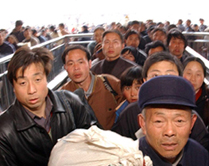
Reform of the rural-urban separation system from a strategic height is the best way to protect the rights and interests of migrant rural workers.
The difficulties migrant workers have encountered in receiving defaulted pay have become a prominent issue in recent years. In some extreme cases, migrant workers were assaulted by employers, and some were even driven to commit suicide out of despair for the apparent hopelessness of their situation.
According to statistics from labour departments, total payment owed to migrant workers reached 40 billion yuan (US$4.8 billion) in 2002.
Such default cases mostly happen in such labour-intensive industries as catering, manufacturing and construction. It is in the latter the problem is most severe. According to the All China Federation of Trade Unions, defaulted payment in the construction industry accounts for 70 per cent of the total estimated 100 billion yuan (US$12 billion) of the nation's current default.
Unfortunately, the cause of the default lies mostly in the government's hands.
Some local governments ask construction companies to start projects in advance and pay them later. Statistics provided by the Ministry of Construction indicate unpaid compensation to construction companies reached 336.5 billion yuan (US$40.5 billion) in 2002, and most was owed by local governments.
Still, the labour market is not mature enough. Some enterprises have little legal sense or just give up management in labour issues for the sake of more profits. Added to that, the government supervisory departments have been weak in regulating the market and the current Labour Law is not actively enforced to protect interests of migrant workers.
Defaulted pay to migrant workers is a socio-economic problem. Without related laws, regulations and effective measures to respect and protect migrant workers, high-profile government circulars and annual reports will not solve the problem.
In fact, the payment default issue is just a fraction of the big picture of the daily trials and tribulations faced by the rural population in today's China. The huge contrast between migrant worker's contribution and their social status needs to be properly addressed.
Farmers-turned-workers are playing an increasingly important role in urbanization, but they are seeing decreasing benefits.
In South China's Guangdong Province where migrant workers contribute a quarter of its gross domestic product (GDP) growth, their annual income increased by less than 100 yuan (US$12) over the past 10 years. For a long time, migrant rural workers have contributed to China's low-cost labour, yet their living environment and social status have hardly improved over the decades.
Besides difficulties in getting their payment on time, migrant workers also find it hard to sign valid labour contracts, send their children to urban schools and join trade unions.
Though the old policy that prohibited farmers from finding jobs in cities has been lifted, discrimination in employment and public service still exists.
Migrant rural workers often find their interests violated while protection from government departments is difficult to access. These people are discriminated against in public administration too. They get unfavourable treatment in social security, housing, and the residence registration system. They are even regarded as elements disrupting social order.
The right to work is the constitutional right of all citizens.
Yet, the residence registration system remains an institutional power producing and allowing discrimination. It was created to cater to the industrial strategy in the old planned economy, but is still closely connected with the employment and social security system in place today.
Such a system separates rural and urban areas and puts the rural population at a distinct disadvantage.
Once established, this system is able to reinforce itself. In the past, in order to protect the re-employment of laid-off urban workers, local governments set rigorous limits on the employment of farmers-turned-workers. The discrimination was reinforced by local laws and regulations, to the point where the rights and interests of farmers-turned-workers were virtually non-existent.
One of the results of this long-standing urban-rural separation policy and discrimination on migrant workers is that urbanization has fallen far behind industrialization in China.
The development of agriculture and the rural economy still face the problems of limited resources per capita and low productivity. Reducing the rural population and promoting urbanization is the way to boost the rural economy. Without such a step forward, there will be no economic basis for urbanization, nor a rural-urban unified market economy, let alone an all-round prosperous society.
At present the number of farmers-turn-workers is around 94 million nationwide, and the annual increase is estimated to be 13 million in future. The State Council issued a circular last January requesting local governments to cancel various limits on the employment of farmers-turned-workers and give equal treatment to rural and urban citizens. Such a policy shows the right direction for developing the market economy and reforming social administration.
Changing the old concept of the planned economy and urban-rural separation will not only better protect the rights and interests of farmers-turned-workers, but also boost building a well-off society in an all-round way.
(China Daily February 9, 2004)
|

